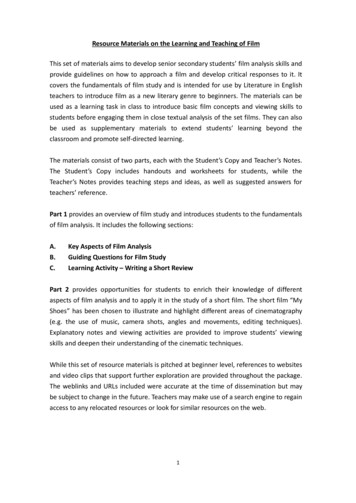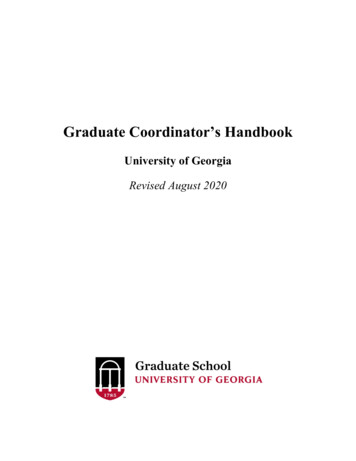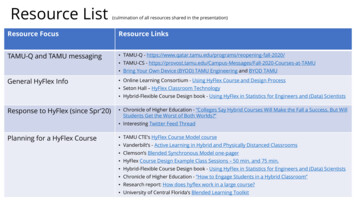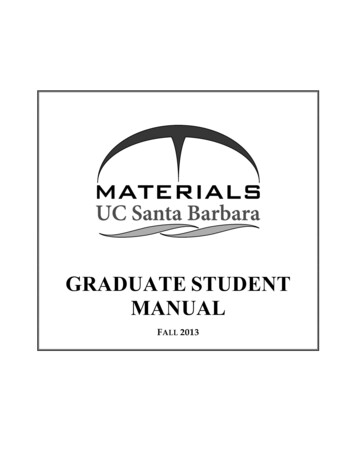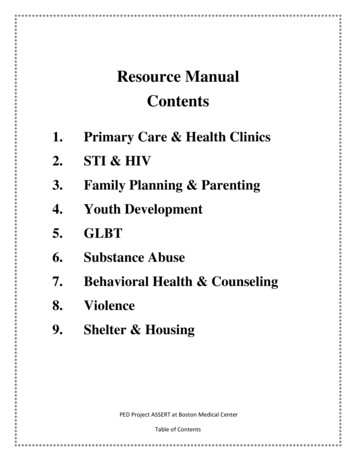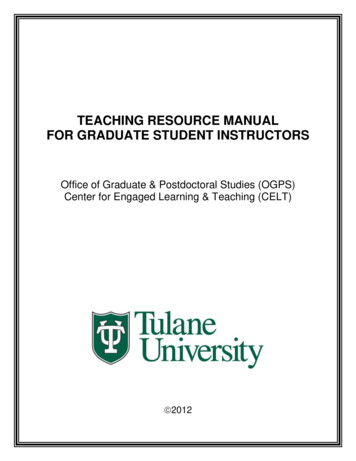
Transcription
TEACHING RESOURCE MANUALFOR GRADUATE STUDENT INSTRUCTORSOffice of Graduate & Postdoctoral Studies (OGPS)Center for Engaged Learning & Teaching (CELT) 2012
Table of ContentsINTRODUCTION . 3Welcome . 3Contact Information . 3PREPARING TO TEACH . 4Know Your Department . 4TA Obligations. 5Tulane’s Academic Divisions . 6Registration and Enrollment . 7Making a Syllabus . 8Starting Off Right .11Planning an Effective Lecture .12Class Discussions and Collaborative Learning .14Giving Exams and Grades .15Teaching Portfolios: Documenting your Teaching .18TEACHING POLICIES & GUIDELINES . 19Absences from Class .19Academic Integrity .19Code of Academic Conduct . 19Preventing Academic Conduct Violations . 20Detecting Academic Conduct Violations . 21Consensual Relationships.22Diversity in the Classroom .22Diversity Statement . 22Your Role as an Instructor . 23Educational Records.24Equal Opportunity, Harassment, and Anti-Discrimination Policy and Procedure .25Anti-Discrimination Statement . 25Harassment Policy. 26Photocopying Copyrighted Materials .26Student Conduct .27Code of Student Conduct . 27Classroom Conduct . 28Students with Disabilities .28TEACHING RESOURCES . 30Center for Engaged Learning and Teaching .30Academic Advising Center .30
Classrooms and Equipment .30Classrooms. 30Technology Enabled Classrooms. 31Equipment Reservations . 31myTulane . 31Photocopying Equipment . 31Foreign Language Resources .32Language Learning Center (LLC) . 32Foreign Language Instructional Technology Environment (FLITE) . 32Innovative Learning Center .32International Resources .32Study Abroad . 32International Students . 33Bilingual Students . 33Library Services .34Research Workshops . 34Research and Course Guides . 34Reserves . 34Public Service .34Public Service Graduation Requirement . 34Workshops . 35Service Learning Course Approval . 35Student Resources & Support Services (SRSS) .35Reporting Concerning Behaviors . 36Early Warning Signs . 36Textbooks .37Tutoring Center .37University Technology Services .37Tech Support . 37Technology Commons . 38Email Accounts . 38World-Wide Web Accounts . 38Network Storage Space . 38Software . 38Technology Connection (TC) . 38Writing .38Writing across the Curriculum . 38Writing Center. 39USEFUL LINKS . 40APPENDIX . 412
INTRODUCTIONWelcomeTulane University’s ten academic divisions enroll approximately 5,000 graduate andprofessional students and about 8,400 undergraduates. As a new Teaching Assistant(TA), you take on an additional, important role in the university community through yourcontributions to the quality of undergraduate education at Tulane. In fact, you may beone of the main points of contact for many undergraduates, especially freshmen andsophomores, who are entering university life for the first time. You are also in a positionto share your knowledge and passion for learning with students whose futures you havethe power to influence. The students you teach at Tulane represent a diverse populationin terms of gender, nationality, age, race, culture, ability, religion, and lifestyle; thisdiversity will add to the challenges and opportunities that you face as an instructor.Some TAs at Tulane are experienced teachers, while others have never taught before.All TAs assume the challenging task of performing simultaneously as teacher andgraduate student. The Center for Engaged Learning and Teaching (CELT) offerstraining and resources that can help you succeed as an instructor. As you perform yourteaching duties in the coming months and years, we hope that you will use CELT’s webresources, training programs and personnel to enhance your teaching skills and yoursense of community with other Tulane educators.The Office of Graduate and Postdoctoral Studies (OGPS) is here to support you in yourdual roles as graduate student and university instructor. Consider OGPS – along withCELT and your academic department or program – your primary sources for informationand assistance regarding teaching, research, service, and professional development.Contact du247-12133
PREPARING TO TEACHKnow Your DepartmentEach department has its own set of policies and requirements regarding the course orsection that you have been assigned to teach. In addition, some departments requirethat you use certain textbooks, or that you administer particular assignments or examsat certain times during the semester. Information about your teaching that you canexpect to get from your department includes the following: assignments of teaching times and course section numbersinformation about which textbooks, if any, your department requires you to useexam requirements, including frequency, content, and possibly formattextbook order forms and deadlines for submitting book ordersinformation on how to order instructor copies of your textbooksassignment of office spacenumber of weekly office hours you will be expected to keepYou should have a faculty member from the department in which you are teachingassigned to you to oversee your work and serve as a course mentor and advisor. Thisfaculty member may or may not be the same as your research advisor, and the rolethey will play in the execution of your teaching duties will vary widely. Regardless ofwhether you are responsible for your own section, or are one of several teachingassistants in a laboratory course, there should be a faculty member assigned to you toanswer questions and assist you in your course. If you do not have a faculty memberassigned to you, ask the department chair or program administrative assistant.Your faculty advisor or department administrative assistants may ask you to submit yourscheduled office hours so that they can keep a master schedule. Also, manydepartments will furnish you with a telephone/email directory of that department’sfaculty and instructors. Some departments furnish their instructors with a photocopyingaccount and most provide mailboxes. All teaching assistants are required to receivepaychecks via direct deposit. Consult the department for your pay schedule.A valuable resource for all of this information is your department’s administrativeassistant(s). Introduce yourself to these important people early in the semester, and besure to cultivate friendly relationships with them. They will probably save you manyhours of frustration throughout the course of your graduate studies. Other people youwill want to meet include your department chair, your department’s director of graduatestudies, and the person(s) responsible for graduate studies in your school. In addition,some departments and schools have a leader for graduate student teaching who mightbe a faculty member or a senior graduate student.4
TA ObligationsThe obligations listed here apply generally to all courses and TA-led sections at Tulane.Your department or the faculty member you assist may require additional obligations.Be sure to contact your department administrative assistant and the faculty member youassist before the semester begins in order to make sure that you understand yourdeparment’s expectations. Meet every scheduled class. The university’s course credit system is based uponcontact hours. In general, a three-credit course meets for three hours each week, soit is important that you meet during every scheduled class period. If you know inadvance that you will miss a particular class period, the unofficial policy of courtesyobserved in most departments demands that you try to find another teacher or TAwho can fill in for you. If you must cancel a class or change a meeting time on short notice due to a realemergency, be sure to telephone your department secretary so that she/he will beable to dispatch a messenger to inform students that class will be cancelled. Hold regular office hours during which you keep your door open and make yourselfavailable to talk with students. Notify students in advance of any change in youroffice hours. If you must cancel your office hours unexpectedly, notify yourdepartment secretary or your class. If you are solely responsible for the class (rather than being TA to a faculty member),provide students with a syllabus on the first day of class. All course syllabi arerequired to be posted on the course home page on myTulane, even if you do nototherwise use myTulane for the class. Refer to the “Making a Syllabus” section ofthis handbook for tips on creating your syllabus. Follow the syllabus or course outline as closely as possible. If you find that thesyllabus no longer works (because you need to push back due dates, changeassigned readings, etc.), provide students with an updated copy. On the first day of class, provide students with a written statement of your coursepolicies regarding expectations, grading, and attendance. Hold the final examination as scheduled. The final must be given on the date thatthe Schedule of Classes gives for your class period’s final exam. If you give a takehome exam, it may not be due before the scheduled exam date. The official ’sOffice(http://www.tulane.edu/ registra/index.shtml) Keep accurate records of student attendance. Refer to the “Absences from Class”section of this handbook for further information.5
Keep accurate records of all work that students hand in, including grades given forassignments and tests. You may find the course homepage on myTulane to beuseful for grade keeping. Retain copies of final examinations; a University regulation requires that theinstructor retain copies of all student examinations for six months following the dateof the exam. Notify your students of the Code of Academic Conduct that governs their behaviorregarding academic integrity. The Code of Academic Conduct (formerly known asthe “Honor Code”) can be found online at http://tulane.edu/college/code.cfm.Become thoroughly familiar with this document and ensure that your students haveread it. Refer to the “Academic Integrity” section of this handbook for furtherinformation on the code. Keep photocopies of any student work that you suspect of academic dishonesty,such as plagiarism or cheating. Report all suspicious work to your faculty advisor ordepartment chair, who will help you decide how to proceed. Please note that youmay not simply reduce or assign a failing grade to work that you suspect of beingplagiarized or illicitly obtained, since you will be in violation of the Code of AcademicConduct.Tulane’s Academic DivisionsNewcomb-Tulane College is the academic home for all of Tulane's full-timeundergraduate students. Created after the 2005 academic reorganization of theUniversity, the college provides academic services for students, including advising,honors, study abroad, and a variety of student programs. When you are asked foradministrative purposes which “college” or “school” a particular student is enrolled in,the correct answer is probably “Newcomb-Tulane College.” However, the student maybe pursuing a degree in one of the following divisions: School of ArchitectureA.B. Freeman School of BusinessSchool of Liberal ArtsSchool of Science and EngineeringSchool of Public Health and Tropical MedicineThe University actually has a total of ten academic divisions, but three of these enrollgraduate and professional students almost exclusively; they have few, if any,undergraduate programs or majors. These are the Schools of Law, Medicine, andSocial Work. One exception is the Medical Scholars program in the School of Medicinein which elite undergraduates simultaneously pursue a medical degree.You may also have students from the School of Continuing Studies (SCS) in yourcourse. SCS provides lifelong learning on a part-time basis. Many SCS courses are6
cross-listed with departments in other schools. For a complete list of Tulane’s academicdivisions, see the University Catalog (http://tulane.edu/advising/catalogs.cfm).TAs a
Tulane’s Academic Divisions Newcomb-Tulane College is the academic home for all of Tulane's full-time undergraduate students. Created after the 2005 academic reorganization of the University, the college provides academic services for students, including advising,

